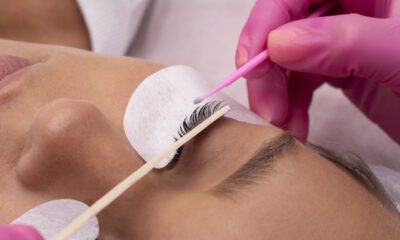Health
Transform Your Rout Hair: Top Tips for Healthier Hair

One of the areas that most of us are usually neglecting is the Rout Hair – a very important part of our hair health.
When it comes to hair products, we can listen to so many commercials with instructions on how to take care of our hair tips, while the base of hair health is actually roots? This full guide will cover what root hair is and why it matters, how to maintain hair problems, and how to solve them so as to keep your hair healthy from the roots to the ends. Now, let’s start this process of revealing the best ways of managing our hair health to the most optimum level.
Understanding Root Hair: The Basics
Root hair is defined as the tiny hair like prolongation originating from the root of plant as an organ for absorption of water and nutrients. However, in the discussion of the human hair, rout hair can be used to describe the hair that grows directly from the human scalp which may be termed as the basic or the fundamental hair strand. This part of the hair is very important as it also acts as the reservoir of which nutrients from the scalp influence either the growth of a specific hair shaft or the overall health of the hair.
The Importance of Root Hair Health
Healthy hair at the root level is the foundation in which hair health fundamentally thrives. Here’s why:
- Nutrient Absorption: Just as the some extensions of root hairs in plants grabbing the nutrients from the soil, the root of hair catches nutrients from the scalp. Proper food nutrition to the scalp means that hair also gets adequately nourished hence promoting stronger hair strands.
- Growth Stimulation: They also revealed that it is the necessary roots of this hair that will help to promote hair growth. They initiate hair matrix cells thus enhancing the growth of hair from the follicle base and hence improved thickness and population of hair.
- Scalp Health: An affectionate skin readily translates to healthy hair roots. Some of these diseases of the skin may include dandruff, dry scalp, and scaliness, or perhaps excessive production of sebum may also hinder the quality of hair roots.
Common Root Hair Issues and Their Causes
Some of the general Hair follicles problems and their causes included the following:
Several problems can affect rout hair: they can be rough and damped, and this will in turn detrimentally affect the whole hair. Here are some common problems and their underlying causes:
- Weak Roots: It can result from inadequate diets, gland dysfunctions, or overprotection of the hair through greasy products.
- Dry Scalp: Can be attributed to the use of chemical-laden hair care products, weather conditions or lack of moisturization leading to weakened hair roots and frequent hair shedding.
- Oily Scalp: Too much oil build up can block hair follicles and hence, limit hair growth or cause symptoms of dandruff and seborrheic dermatitis.
- Dandruff: Brought about by fungi or dry skin, dandruff causes extensive problems to the roots and can cause itching and hair loss.
How to Maintain Healthy Rout Hair: Tips and Tricks
Healthy root hair involves the healthy nutrients, natural and appropriate hair care practices, and logical living standards that are required to be fulfilled. Here are some effective tips to ensure your roots stay strong and healthy:
1. Balanced Diet
Animal nutrition is the foundation of hair strength and most of the nutrition is derived from the diet. Incorporate the following nutrients into your diet to promote root hair health:
- Protein: Hair is mostly made from keratin, which is a protein. This should be complemented by proteins such as eggs, lean meats, and legumes in order to obtain enough amount of it.
- Vitamins: Vitamin A, C, D and E are some of the most important vitamins that assist in maintenance of hair. You can incorporate such food items in your diet as fruits, vegetables, nuts and seeds.
- Minerals: Iron, zinc, and magnesium are vital for hair growth and if lacking can result in hair loss. Such foods as spinach, nuts, and whole grains are great examples of good sources of gamma-tocopherol.
2. Hydration
Keeping one’s skin, particularly the scalp as well as roots of the hair well hydrated is important in promoting healthy hair. This is one of the secrets of a healthy scalp The recommended amount is eight glasses of water per day to allow for the delivery of healthy nutrients to your roots.
3. Scalp Care
- Regular Cleansing: Head shampoo using a gentle sulfate-free product to wash the scalp. In this case, it is most important to wash less frequently, as this may exacerbate the problem and the natural oils of the scalp will be removed.
- Exfoliation: Scalp scrubs and washes that can be done from time to time in order to make sure that the skin on the scalp, as well as the products that were applied are cleared out of the scalp’s surface.
- Massage: Scalp massaging helps improve blood flow to the head resulting in increased supply of nutrient to the hair roots in particular.
4. Avoid Harsh Chemicals
Use fewer hair care products that possess ingredient such as sulfate, paraben, or silicon at the chemical store. These are dangerous and cause negative impact on scalp and decrease hair follicle strength. Reduce the use of chemical products on the hair especially when dyeing or perming the hair to take care of the roots.
5. Protect Your Scalp
To prevent damaging your scalp try wearing hats or using scarves during periods of exposure to the elements including UV radiation, wind or low temperatures.
6. Regular Trims
Styling your hair also makes it easier to avoid leading to split ends and breakage thus could be beneficial in encouraging healthier root hair by reducing the stress exerted on the scalp and or follicles.
Home Remedies for Root Hair Health
In addition to the above tips, several home remedies can nourish and strengthen root hair:
1. Aloe Vera
The gel found inside the leaves of aloe vera plants is very popular for its effective healing and skin softening. Please, use a new layer of the aloe vera gel for the scalp, cover your head with a shower cap, and wait for 30 minutes before washing. This is useful in preventing any build up on the scalp and as well as in hair regrowth.
2. Coconut Oil
Coconut oil is great for deep conditioning of hair and has been recommended for use in the process. Apply coconut oil on your hair, warm it up slightly, eventually applying it on your scalp and let it stay there for a few hours or even though the night and wash when you are ready. It is essential to nourish the scalp and the roots of the hair in order to keep and strengthen them.
3. Onion Juice
Crucial nutrients like sulfur found in onion juice increases the formation of collagen thus, promoting hair growth. It can be prepared by squeezing onions and the juice then massaged on the scalp for half an hour before washing the hair using gentle soap.
4. Green Tea
Green tea has several benefits and we all know that it contains antioxidants that are good for the hair. You can prepare green tea, cool it, and then make a final rinse wash with it to enhance the scalp and roots.
Professional Treatments for Root Hair Health
At other times, a professional intervention may be needed to resolve consistent primary hair challenges. Here are some treatments to consider:
1. Scalp Treatments
Anti-dandruff and conditioning shampoos, which can be bought over the counter or received at beauty parlors, can remove product residues, prevent seborrhea and dryness, and promote skin’s nutrition.
2. Hair Spa
Hair Spa as the name suggests is a treatment that includes deep conditioning of hair and also massaging of the scalp that enhances blood supply to hair roots.
3. PRP Therapy
Another popular treatment is platelet-rich plasma or PRP therapy that involves the injection of a platelet concentrate derived from the person’s own blood to the hairline to boost the root’s function and encourage the growth of new hair strands.
4. Laser Therapy
Low level laser therapy could be effective in stimulating the flow of energy at the cellular level on the hair follicles hence promoting hair growth, and a healthy base.
Conclusion: Root Hair Health is the Foundation of Beautiful Hair
Generally, root hair also requires proper conditioner and nutrition to ensure healthy hair and free from split-end hair. To reinforce healthy roots, you should consider taking balanced diets, not only for your hair but also for your scalp; this means that one should avoid using chemicals products that damage the scalp and hair. Home care and salon procedures can also aid in maintaining the health of hair scalp, especially if it’s colored or permed. They also respect the natural look and extra time is spent on the roots to ensure the beautiful hair you see is the foundation of your look. If you can cultivate the basics right and make them flourish, everything else will always fall in place.
At such a stage, by practicing the above-discussed measures and tips, we are guaranteed of achieving the aspect of perfectly managed root hair for these beautiful natural human hair.
Health
Nutritional Counseling for Eating Disorder Recovery

Eating disorders represent serious medical conditions which damage both physical structure and mental wellness of the patients diagnosed with anorexia bulimia or binge eating disorder. The recovery from eating disorders becomes intricate because patients need to address multiple treatment elements simultaneously. The recovery process requires nutritional counseling as the essential factor for people to reconstruct an appropriate connection with food while achieving the correct dietary balance needed for lasting recovery success.
Understanding Eating Disorders
Heartening patterns of irregular eating become harmful mental health conditions which contain problematic thoughts along with abnormal behaviors about food. People with anorexia nervosa severely limit food consumption because they fear becoming overweight and additionally show weight dissatisfaction whereas bulimia nervosa patients engage in binging eating habits requiring subsequent purging procedures. People who have binge eating disorder experience multiple occurrences of eating big meals despite avoiding behaviors that compensate for the eating episodes.
The Role of Nutritional Counseling in Eating Disorder Recovery
Eating disorder recovery needs nutritional counseling to bring back healthy eating patterns along with treatment for nutritional deficiencies. Eating disorder treatment in Dubai focuses on guiding people toward nutritious relationships with eating that eliminate food fears and eating-related guilt. As a main factor, patients need education about proper nutrition alongside learning to build healthy food relationships. Medical nutrition therapy enables diagnosing eating disorder-caused symptoms such as low energy and digestive troubles while immunity weakness while restoring vital nutrients to the body.
Sales individuals who have received nutritionist training work with clients to generate individualized eating plans based on diversity and nutritional equilibrium and proper caloric loads. The formal structure of this approach gives people the opportunity to construct better eating routines with help from a compassionate network free from criticism. Through nutritional counseling patients gain knowledge to choose food in a confident manner thus breaking down their eating-related shame and anxiety.
Key Components of Nutritional Counseling
Nutritional counseling starts with an extensive evaluation of each patient. A registered dietitian analyzes how clients eat while reviewing their medical information plus detecting emotional and physical effects from their eating disorder. Evaluating suitable nutrition needs and improving weaknesses becomes easier through this method.
A customized eating strategy is formed after establishing everyday meals which unite various nutrients between proteins and healthy fats together with complex carbohydrates. Such planning helps persons recover their physical health without neglecting the emotional and psychological impact of food consumption. The process of achieving success depends on practical and reachable objectives which clients achieve through continuous determination towards their improvements versus their pursuit of unending perfection.
The dietitian will assess patients’ recovery through scheduled appointments to modify their dietary plan if necessary or resolve any obstacles which stand in the way of healing. The continuous support system provided to clients helps maintain their motivation and achieves their recovery objectives.
Psychological Support in Nutritional Counseling
Natural healing for eating disorders combines mental and dietary aspects to achieve recovery. Individuals who suffer from eating disorders commonly experience intensive mental health challenges about their self-perception together with their personal value and food control disputes. The nutritionist must perform duties which surpass developing standard meal plans when dealing with these situations. A person needs psychological support because mental and emotional obstacles make recovery much harder to achieve.
Nutritionists and online therapists Dubai collaborate to provide patients with complete recovery solutions together. Through partnership these experts support patients in managing the eating disorder mental challenges that include weight fears along with food obsessions and eating disorders. The therapy aims to construct self-compassion while fighting detrimental thought cycles to improve positive body perception to create therapeutic results for mental and physical wellness.
Challenges in Nutritional Counseling
The practice of nutritional counseling comes with several obstacles even though it offers positive effects. The main impediment to change exists in the form of client opposition. People who suffer from eating disorders have either strong resistance to eating proper food or intense anxiety about consuming increased portions. The development of trust alongside motivation stands as a fundamental requirement in patient recovery because they need to understand this support system throughout the process.
Thwarting the psychological barriers remains difficult to manage. Eating disorders manifest from internal fears and anxieties which require more than nutritional support to resolve. To achieve successful recovery patients need to receive help from mental health specialists who evaluate their core problems.
The Long-Term Benefits of Nutritional Counseling
Such counseling provides both immediate weight restoration with additional lasting advantages. Nourishing one’s body and establishing a healthy food relationship enables individuals to maintain prolonged recovery during which they achieve superior quality existence. When treatment addresses complete eating disorder symptoms from a physical and emotional perspective people can stay away from worsening health conditions while living balanced lives.
Improvement of both mental clarity and energy levels are among the complete lifestyle enhancements that come from undergoing nutritional counseling. When individuals build healthier food habits they can preserve them into adulthood thus creating a state of peaceful coexistence with their food.
Conclusion
Eating disorder recovery requires nutritional counseling for its successful completion. Nutritional counseling enables medical recovery and food relationship building and assists in treatment of emotional factors that influence how people eat. Long-term recovery requires personal meal plans and psychological help in addition to sustained education which nutritional counseling provides to everyone. Steering toward recovery and embracing a balanced healthier lifestyle requires all individuals with eating disorders to ask for help from medical professionals and dietary experts.
Health
Upcoming Medical Conferences in India: Latest Innovations in Healthcare

India, a global hub for medical marijuana card NY advancements and healthcare innovation, frequently hosts some of the most significant medical conferences in the world. These events serve as platforms for researchers, practitioners, and industry leaders to exchange ideas, present research findings, and discuss the future of healthcare. This year is no different, with a plethora of conferences lined up across the country to showcase groundbreaking developments in the field. Here’s a comprehensive guide to some of the most anticipated medical conferences happening in India and the latest innovations they promise to highlight.
1. Indian Medical Association (IMA) Annual Conference
The IMA Annual Conference is a cornerstone event for medical professionals in India. This year’s theme focuses on “Integrating Technology for a Healthier Tomorrow.” The conference will cover various aspects of healthcare technology, from AI-driven diagnostics to telemedicine solutions.
Key Highlights:
- Workshops on artificial intelligence in diagnostics and patient management.
- Panel discussions on ethical challenges in adopting new technologies.
- Exhibitions showcasing the latest medical devices and health tech innovations.
This conference is an excellent opportunity for practitioners to stay updated on technological trends that are transforming the healthcare landscape.
2. MedTech India Expo and Conference
MedTech India is a premier event for the medical technology industry. It brings together innovators, manufacturers, and healthcare professionals to discuss the role of technology in improving patient outcomes.
Key Highlights:
- Launch of cutting-edge medical devices.
- Sessions on 3D printing in surgery and personalized medicine.
- Networking opportunities with global healthcare leaders.
This conference aims to bridge the gap between technology and clinical application, making it a must-attend for those interested in the future of MedTech.
3. Global Health Summit by AAPI
Organized by the American Association of Physicians of Indian Origin (AAPI), the Global Health Summit focuses on improving healthcare accessibility and affordability in India.
Key Highlights:
- Discussions on public health challenges in rural India.
- Collaborative projects between Indian and international institutions.
- Seminars on leveraging AI and blockchain in healthcare.
The summit also includes outreach programs aimed at addressing healthcare disparities in underserved areas.
4. Oncology Update Conference
This specialized conference brings together oncologists, researchers, and pharmaceutical companies to discuss the latest advancements in cancer treatment and research.
Key Highlights:
- Innovations in immunotherapy and targeted therapy.
- Emerging trends in early cancer detection.
- Collaborative workshops on clinical trials.
Attendees can gain valuable insights into the evolving field of oncology, making this conference a focal point for cancer specialists.
5. CardioCon India
CardioCon India is dedicated to advancements in cardiovascular medicine. The event features interactive sessions and presentations from leading cardiologists and researchers.
Key Highlights:
- Updates on minimally invasive cardiac procedures.
- AI and machine learning applications in cardiology.
- Workshops on emergency cardiovascular care.
This conference is particularly beneficial for cardiologists seeking to enhance their clinical expertise.
Latest Innovations in Healthcare to Look Forward To
1. Artificial Intelligence and Machine Learning
AI continues to revolutionize healthcare by enabling faster diagnoses and personalized treatment plans. Several conferences, including the IMA Annual Conference and CardioCon India, will delve into AI applications in diagnostics and treatment.
2. Telemedicine
Telemedicine has emerged as a game-changer, especially in the wake of the COVID-19 pandemic. Events like the Global Health Summit will focus on telemedicine’s role in improving healthcare access in remote areas.
3. Robotics in Surgery
Robotic-assisted surgeries are gaining traction for their precision and reduced recovery times. MedTech India Expo will showcase the latest robotic surgical systems, highlighting their applications in minimally invasive procedures.
4. Genomics and Personalized Medicine
Advancements in genomics are paving the way for personalized medicine, where treatments are tailored to individual genetic profiles. The Oncology Update Conference will feature sessions on how genomics is transforming cancer care.
5. Sustainable Healthcare Solutions
With the growing focus on environmental sustainability, conferences like the Global Health Summit are expected to discuss eco-friendly practices in healthcare, such as reducing medical waste and adopting renewable energy sources in hospitals.
Why Attend These Conferences?
- Networking Opportunities: These events bring together professionals from diverse backgrounds, providing an excellent platform for networking and collaboration.
- Knowledge Sharing: Attendees can gain insights into the latest research findings, clinical practices, and technological innovations.
- Skill Development: Workshops and hands-on sessions help practitioners enhance their skills and stay competitive in their fields.
- Exposure to Cutting-Edge Technology: Exhibitions and live demonstrations offer a glimpse into the future of healthcare technology.
Conclusion
India’s medical conferences are not just events; they are gateways to the future of healthcare. By attending these conferences, healthcare professionals can stay ahead in their fields, contribute to the advancement of medicine, and ultimately improve patient outcomes. Whether you are a medical student, a seasoned practitioner, or an industry leader, these conferences offer something valuable for everyone. Mark your calendars and prepare to be inspired by the latest innovations in healthcare!
Health
The Top 10 Health Concerns in the United States

For millions of Americans, health difficulties create severe challenges in the fast-paced world of today. Knowing about these common ailments, which range from sepsis to heart disease, can help individuals to take preventative action and live better lives. The top 10 health concerns in the US are investigated in this blog article, along with information on their causes, symptoms, and potential solutions.
1. Heart Conditions
In the US, heart disease continues to be the main cause of mortality. It comprises a multitude of disorders, including heart failure, hypertension, and coronary artery disease. The risk can be elevated by things including genetics, smoking, bad eating, and inactivity. A healthy lifestyle, periodic exams, and the care of underlying medical disorders are all components of successful prevention.
2. Cancer
Every year, countless American families are touched by cancer. Numerous cancers, including those of the breast, lung, and prostate, have been associated to genetics, environmental exposure, and lifestyle behaviors. Screenings for early detection can considerably boost the efficiency of treatment. Many individuals still have hope owing to breakthroughs in treatment.
3. Long-Term Respiratory Conditions
Lung function is influenced by chronic respiratory disorders such as asthma and chronic obstructive pulmonary disease (COPD). Smoking, air pollution, and employment dangers are the primary factors. Using prescription medicines, avoiding pollutants, and quitting smoking can all help to lessen symptoms and boost quality of life.
4. Being overweight
In the US, obesity is becoming a growing concern as it is connected to various health dangers, including diabetes and heart disease. Obesity is caused by a multitude of causes, including sedentary lifestyles and high-calorie meals. A multimodal method comprising mental therapy, physical activity, and food instruction is needed to address this condition.
5. Diabetes
Obesity and a sedentary lifestyle are usually related with diabetes, especially type 2. Serious negative effects like renal failure and cardiac difficulties may develop from it. Medication, glucose monitoring, and lifestyle adjustments are all part of treatment. Early diagnosis and awareness are key.
6. Disorders of the Mind
People’s quality of life is profoundly influenced by mental health problems including anxiety and depression. Two key difficulties are stigma and restricted access to mental health care. Better mental health results can be attained with a multidisciplinary strategy that incorporates therapy, medication, and support groups.
7. Alzheimer’s illness
Alzheimer’s is a degenerative neurological illness that weakens cognitive and memory ability. Age, genetics, and lifestyle variables are considered to be key influencers, however the specific rationale is still being explored. With an emphasis on early detection and viable therapies to minimize development, research is continuously being performed.
8. Pneumonia and Influenza
Respiratory infections like influenza and pneumonia can cause major complications, especially in elderly adults and persons with weaker immune systems. Effective preventative techniques include regular vaccines and basic personal hygiene. A rapid recovery depends on early treatment.
9. Disease of the Kidneys
Chronic renal illness, which is commonly brought on by diabetes or high blood pressure, causes a gradual reduction in kidney function. Since there may not be many symptoms in the early stages, frequent testing is necessary. Controlling risk factors and, in severe circumstances, dialysis or transplantation are all part of therapy.
10. Sepsis
A potentially lethal reaction to infection, sepsis causes organ failure and tissue damage. It’s vital to diagnose and treat people immediately. Lifesaving strategies include boosting understanding of the early warning signals of sepsis. Prevention requires prompt infection treatment and adequate infection control.
In conclusion
A multimodal strategy encompassing education, early detection, lifestyle adjustments, and access to healthcare services is needed to address these health risks. We may attempt to minimize the prevalence of these ailments and promote the health of every American by supporting proactive health management and raising public understanding.
Five Pointers for Handling Typical Health Problems
1.Make routine health checks a priority: For disorders like kidney disease, diabetes, and cancer, early detection is vital. Maintain routine checkups and screenings to spot probable issues early and considerably boost treatment success.
2.Eat a Well-Balanced Diet: Obesity and related problems including heart disease and type 2 diabetes may be prevented with a diet heavy in fruits, vegetables, nutritious grains, and lean meats. It’s also vital to keep away from processed meals and sugar-filled drinks.
3.Remain Active: Engaging in regular exercise benefits mental health, heart health, and the maintenance of a healthy weight. Every week, strive to engage in at least 150 minutes of moderate-intensity activity, including swimming, cycling, or walking.
4.Stop Smoking and Limit Alcohol: While excessive alcohol consumption can cause liver damage and other health concerns, tobacco smoking is a primary contributor to respiratory diseases. If required, receive help stopping smoking and consuming alcohol in moderation.
5.Control your stress and mental well-being: Include stress-relieving methods in your normal routine, such as yoga, meditation, or deep breathing exercises. If you’re battling with mental health concerns like depression or anxiety, receive expert support to enhance your general wellness.
FAQs
1.Which health issues are most frequent in the United States?
Heart disease, cancer, long-term respiratory disorders, obesity, diabetes, mental health issues, Alzheimer’s, influenza, pneumonia, renal disease, and sepsis are among the most frequent health concerns.
2.How may heart disease be avoided?
A balanced diet, regular exercise, stopping smoking, and regulating blood pressure and stress are all examples of preventative techniques.
3.Which lifestyle alterations can benefit in the treatment of diabetes?
Adopting a nutritious diet, keeping an eye on blood sugar levels, exercising, and taking prescription medicines as advised are crucial improvements.
4.Why is awareness about mental health concerns important?
Increasing awareness allows early intervention, minimizes stigma, and enhances access to resources for mental health.
This guide highlights that even though these health concerns are significant, information, education, and action may lead to a brighter future.
-

 Health11 months ago
Health11 months agoDiscover ://vital-mag.net Blog: Expert Tips for Total Wellness
-

 Business12 months ago
Business12 months agoTikTok Affiliate Marketing | A Complete Guide for Marketers and Creators |
-

 entertainment5 months ago
entertainment5 months agoTop 7 Occasions to Send a Thank You Card and Why They Matter
-

 entertainment5 months ago
entertainment5 months agoCelebrate Life: The Pleasure in Sending Birthday Cards
-

 Home and Gardening11 months ago
Home and Gardening11 months agoSunset Gardens Apartments: Complete Guide
-

 Health11 months ago
Health11 months ago7 Day Juice Fast Weight Loss Results: Expectations & Strategies
-

 Life style12 months ago
Life style12 months agoWhy i stopped eyelash extensions?
-

 Business11 months ago
Business11 months agoSecret Strategies of Competent Trading Companies
